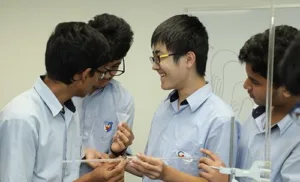Extracurricular activities, or ECAs, have a variety of advantages for students that go beyond the classroom. According to studies, taking part in ECAs can increase social skills, academic achievement, and general well-being. Students learn leadership qualities, time management skills, and exposure to various viewpoints by taking part in activities like sports teams, music ensembles, clubs, or community service initiatives. The best International school in Nagpur provides a lot of options for ECAs for their students.
What Are Extracurricular Activities In Schools?
At schools, extracurricular activities are anything that students do that isn’t part of the core curriculum, such as sports teams, clubs, music ensembles, volunteer organisations, and student government. These activities frequently aim to promote civic duty, intellectual and social growth, and personal interests. Students who participate in extracurricular activities can improve their leadership abilities and develop real-world cooperation, decision-making, communication, and problem-solving skills. Also, they provide children the chance to interact with classmates who have interests or upbringings, strengthening the sense of community in the classroom. A student’s entire educational experience can be improved by involvement in extracurricular activities since these activities give them well-rounded experiences that complement their academic pursuits.
Importance Of Extracurricular Activities In International Schools
At international schools, extracurricular activities are extremely important to children’s overall growth. These activities provide students the chance to pursue their interests outside of the classroom, develop their social skills, increase their feeling of self-worth and leadership potential, and foster a sense of community among themselves. ECAs support diversity, inspire innovation, and promote partnership among various student groups. Students who participate in extracurricular activities do better academically because it gives them a stress release and helps them learn better time management techniques. ECAs also give students exposure to cultural diversity by letting them engage with peers from various cultures and customs.
How Do Extracurricular Activities Benefit You?
Extracurricular activities can benefit children in numerous ways. Some of the main ones are discussed below.
Achieve Academic Excellence
Improved communication, teamwork, leadership, and time management skills are just a few of the many advantages of extracurricular activities. Because both academic institutions and companies value these abilities, extracurricular activities are a great method to encourage academic performance. Also, children who participate in extracurricular activities in school are more likely to achieve academically than those who only concentrate on their schoolwork.
Circle Of Social Connections
Taking part in extracurricular activities may be a great way to make friends and form bonds with others who share your interests. These pursuits frequently provide chances to meet people with the same interests or passions, forming a network of acquaintances that can be quite useful in both personal and professional contexts. People can meet new people, develop friendships, and even create professional networks that could result in collaborations or job prospects by engaging in extracurricular activities in school. Participating in ECAs may also assist in developing leadership, communication, and confidence—all beneficial attributes in both personal and professional contexts. Making time for extracurricular activities may often offer considerable advantages beyond their core function or pastime.
Preparing Children For The Future
Children’s participation in extracurricular activities in school is essential in preparing them for their future endeavours. These activities give individuals a special opportunity to demonstrate their abilities and interests while also assisting them in the development of crucial transferable skills. They provide children the chance to discover who they are while also learning important life values like self-control, cooperation, perseverance, and time management. Sports teams, music groups, and community service initiatives are just a few examples of ECA activities that help students develop the kind of self-assurance and leadership skills that are valuable in the professional world.
Time Management
Children should start learning effective time management as soon as they can. Getting children involved in extracurricular activities for students is a great method to instil the value of time management in them. Children who take part in ECAs gain knowledge of task prioritisation, the deadline set, and effective time management. Students also learn the value of the qualities that are necessary for success in all facets of life: discipline, dedication, and tenacity. ECAs also give children a regulated atmosphere where they may learn how to organise themselves and strike a balance between their academic work and social interests.
Keeps Children Under Management
Extracurricular activities are, without a doubt, the finest tool for parenting successfully. Children are provided a way to channel their energy via diverse activities, including sports, music, art, and other extracurricular ones, while also learning self-discipline and collaboration.
Explore Interests
Engaging in extracurricular activities has been shown to be a valuable tool for helping children explore their interests. ECAs provide an avenue for children to pursue interests that may not be possible within the academic curriculum and allows them to explore new passions. If a child takes school admission to an International school, he or she will get access to a lot of extracurricular activities.
Broader Perspectives
The role of extracurricular activities for students in developing well-rounded individuals is significant as they help children to broaden their perspectives. Engaging in various ECAs like sports, music, arts, or social organisations exposes students to diverse perspectives other than their academic curriculum.
Self-Esteem
Extracurricular activities have been shown to be beneficial in boosting children’s self-esteem. Participating in such activities helps children develop social skills and a sense of accomplishment outside the classroom context. By having opportunities to explore their interests and talents, children can gain confidence in themselves and their abilities. Furthermore, being part of a team or group can foster relationships with peers and give children a sense of belonging. Engaging in ECA also allows for experiences of success and failure that help build resilience and teach valuable life lessons.
Break From Studies
Extracurricular activities play an essential role in the lives of children, as they provide a means to unwind and take a break from regular academic studies.
How Can International Schools Encourage Participation In Extracurricular Activities?
In order to motivate students to participate in extracurricular activities (ECAs), international schools should foster a sense of pride and community among their student body. In order to provide every student the chance to succeed, schools must first make sure that the ECAs they offer are varied enough to include a range of interests and skill sets. Also, it’s critical to tell students fully about each activity’s advantages, such as the development of leadership abilities or the strengthening of interpersonal relationships. Also, by awarding certificates or other forms of recognition to students who participate in ECAs, schools may encourage other students to do the same.
Conclusion
Supporting student participation in ECAs fosters holistic development as students learn valuable life skills while having fun, which will serve them long after they graduate from high school or college.
FAQS
What Is The Main Purpose Of Extracurricular Activities?
The basic goal of extracurricular activities, which have become a crucial component of contemporary educational systems, is to give students a chance to participate in worthwhile activities outside of the classroom that advances their overall development.
Impact Of Extracurricular Activities On Students
The basic goal of extracurricular activities, which have become a crucial component of contemporary educational systems, is to give students a chance to participate in worthwhile activities outside of the classroom that advances their overall development.
Why Should Extracurricular Activities Be Compulsory?
Extracurricular activities are crucial to a comprehensive and well-rounded education. Engagement in extracurricular activities benefits the growth of social, emotional, and cognitive abilities. Every student receives an equal chance to participate in healthy learning outside of the classroom, thanks to mandatory extracurricular activities.
How Do Extracurricular Activities Help A Child?
Children receive several advantages from extracurricular activities in international schools that support their entire growth and well-being. Children who take part in these activities develop crucial life skills, including leadership, time management, and collaboration. A child’s knowledge and interests can be broadened through extracurricular activities, allowing them to pursue their hobbies outside of the traditional classroom.
What Are Some Extracurricular Activities Examples?
Depending on their interests and objectives, individuals can participate in a wide range of extracurricular activities. Taking part in sports teams, giving back to the community, joining academic clubs, going to musical or theatrical performances, competing in debate or speech contests, engaging in creative writing or publishing projects, pursuing leadership positions in student government or social advocacy groups, and engaging in hobbies like photography or outdoor activities are a few well-known examples.


































